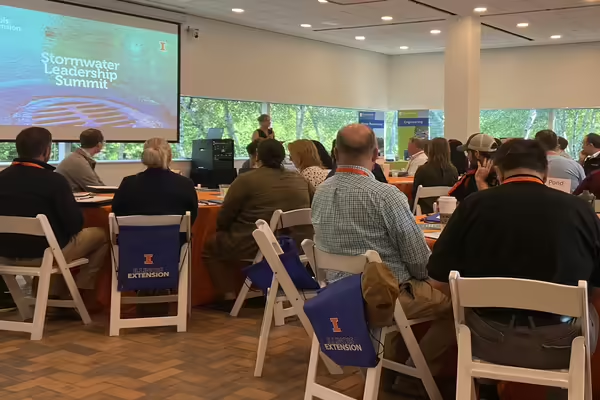
GLENCOE, Ill. — On Sept. 25, more than 100 community leaders, engineers, planners, and stormwater experts gathered at the Chicago Botanic Garden for the first-of-its-kind Stormwater Leadership Summit to address one of Illinois' most pressing infrastructural and environmental challenges.
The summit brought together representatives from municipalities such as Berwyn, Cicero, Crystal Lake, Downers Grove, Maple Park, McHenry County, North Chicago, Riverside, Schiller Park, and Waukegan alongside major regional organizations including the Metropolitan Water Reclamation District of Greater Chicago, Center for Neighborhood Technology, Chicago Metropolitan Agency for Planning, Friends of the Chicago River, and the Natural Resource Conservation Service.
"Stormwater challenges don't recognize municipal boundaries, which is why we need regional approaches and shared solutions," says Durriyyah Kemp, regional associate director of University of Illinois Extension, who organized the summit. "The energy and commitment we witnessed from participants shows that communities are ready to work together on these critical issues."
A day of learning and collaboration
The conference opened with workshops on coalition building, providing participants with frameworks for addressing stormwater challenges in their own communities. Four municipalities shared case studies during the Community Voices session, presenting on the Calumet City Subarea Plan, the Flood and Sewage Vulnerability Coalition, the McHenry County Watershed Planning Initiative, and Hazard Mitigation Planning and Floodplain Management strategies.
A mini-expo showcased organizations and businesses at the forefront of stormwater management innovation, creating opportunities for meaningful connections between public and private sector leaders.
"This summit provided a unique educational perspective to our local stormwater professionals, including our SMC staff, as well as an open dialogue atmosphere for all attendees to collaborate, network, and pool resources," says Kurt Woolford, executive director of the Lake County Stormwater Management Commission. "SMC feels this summit reflected upon the importance of strong local and regional partnerships for continuing to address stormwater issues in Northern Illinois."
Support from state leadership
Governor JB Pritzker expressed his support for the summit's mission in a letter to attendees, stating: "As communities across Illinois face more stormwater challenges due to larger storm events creating water quantity issues, infrastructure mitigation needs, and a lack of resources protecting water quality for all communities, this summit will provide a unique opportunity for community leaders to gain practical tools, learn from successful case studies, and build coalitions to address these challenges collaboratively."
Transformative impact
Post-event surveys revealed enthusiastic responses from attendees, who praised both the practical frameworks and collaborative atmosphere. "This workshop really helped visualize how our leaders and community or communities are connected and can work together towards common goals," one participant noted. "This was helpful even just as our local group; it helped us come up with better ways to engage and inform."
Several communities are already planning to implement lessons learned. One attendee reported plans to use the community capitals framework for updating their organization's mission statement, while another from Boone County expressed interest in replicating the summit model locally.
The blend of academic rigor and practical application resonated strongly with participants. "Loved the guidance from partners at our table and really appreciate the academic approach (reminder) on how to do better at our jobs," says one community leader.
The networking component proved especially valuable, with one attendee commenting, "All speakers were interesting. I loved the event and that it had networking/communication embedded in it. I would love for the next event to happen sooner than a year."
Strong partnership support
The summit was made possible through generous support from Lake County Stormwater Management Commission, MKSK, Fehr Graham Engineers, Farnsworth Group, and Stormtrap. Engineering firms, including Arcadis, Antero Group, Christopher B. Burke Engineering, Ltd. (CBBEL), and Novotny Engineering, also participated, demonstrating the private sector's commitment to supporting regional stormwater solutions.
Looking ahead
The summit concluded with closing remarks from Scott Kuykendall, water resource specialist for McHenry County, Matthew Vann, associate dean and director of Illinois Extension, and Willene Buffet, Cook County Extension county director and chair of the planning committee, emphasizing the importance of sustained collaboration and the role of coalitions in creating lasting change. University of Illinois Extension is committed to ongoing support for communities, offering to facilitate connections, provide outreach and education, and empower regional efforts to address stormwater challenges.
"This is just the beginning," Kemp says. "The relationships formed and the knowledge shared at this summit will serve as the foundation for transformative work across Northern Illinois."
WRITER: Yukta Sinha, Regional Media Communications Coordinator, University of Illinois Extension
MEDIA INQUIRIES: Yukta Sinha, 630-955-1150, ysinha@illinois.edu
University of Illinois Extension develops educational programs, extends knowledge, and builds partnerships to support people, communities, and their environments as part of the state's land-grant institution. Extension serves as the leading public outreach effort for University of Illinois Urbana-Champaign and the College of Agricultural, Consumer and Environmental Sciences in all 102 Illinois counties through a network of 27 multi-county units and over 700 staff statewide. Extension’s mission is responsive to eight strategic priorities — community, economy, environment, food and agriculture, health, partnerships, technology and discovery, and workforce excellence — that are served through six program areas — 4-H youth development, agriculture and agribusiness, community and economic development, family and consumer science, integrated health disparities, and natural resources, environment, and energy.